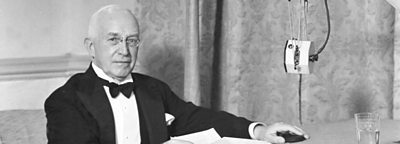Image: Chairman of the Βι¶ΉΤΌΕΔ J H Whitley in 1931.
Governments have always had the power to ban programmes, but those powers have never been applied directly. Instead, on the occasions that they have objected to programmes, Governments have opted for persuasion.
The Hashagen affair in 1932 was one of the first such episodes, and painful lessons were learned.
In spring that year the Βι¶ΉΤΌΕΔ lined up a number of contributors for Hazard, a series of radio programmes about risky exploits. The contributors included two German officers from the Great War - Zeppelin commander Joachim Briehaupt and U-boat commander Ernst Hashagen.
Briehaupt went first, and the talk was greeted with a furious letter from the British Empire Union, declaring that the Βι¶ΉΤΌΕΔ was guilty of a "callous disregard" for listeners' feelings.
The matter was discussed in Cabinet, where ministers echoed the view that the Hashagen broadcast should not go ahead. Ministers stopped short of banning the programme or banning Hashagen from entering the country - another course of action open to them. Instead, the Postmaster General, Kingsley Wood, was asked to pass on to the Director-General, Sir John Reith, the Cabinet's view that the talk should be cancelled.
Reith stood his ground, refusing to cancel the talk without consulting the Chairman, J H Whitley. But Whitley - perhaps worried by threats that the King's imminent visit to the Βι¶ΉΤΌΕΔ's new headquarters at Broadcasting House might be cancelled - was less resolute, and he agreed to stop the broadcast.
He was very unhappy about it, however, as were the press and many MPs. In a letter to the Cabinet Secretary, Whitley he protested at what he regarded as bullying: "The Corporation feels that an incident so contrary to the spirit and intention of the Royal Charter should not pass without protest...The Governors venture to assume that it will not form a precedent."
